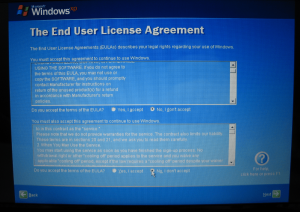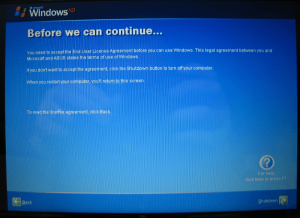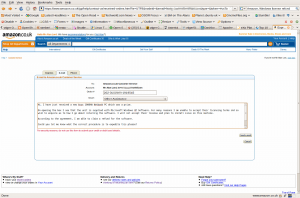Software Patents: The new MAD
With the recent news of Microsoft being told to stop selling MS Word in the US due to it’s infringement of a patent owned by i4i I am really hopeful that perhaps, just perhaps, someone will start to realise just how MAD this all is.
Reading the first story I linked to, there is a reasonably understandable explanation of the patent in question but lets be honest here. Does this sound like an truly new and innovative invention?
“What we have developed at i4i is what’s customarily referred to as ‘customer-centric’ or ‘custom XML,’ which is allowing people to create customer-driven schema — we’ll call it templates or forms. So, while XML is used to tag and to mark the data that’s created, our technology is used to create the whole schema and the management of the data.”
They’ve managed to patent the ability to create your own schema by the sounds of that. Isn’t that what XML is for?
Anyway, I can’t see the good ‘ole boys really winning in the long run. I’m sure it will get over turned when hopefully someone shows up with some prior-art. But it seems to me that with this ridiculous system in the States, they are building their own new version of the Cold War. Remember Mutually Assured Destruction? That’s where they are now.
Businesses like Microsoft, IBM and others build vast portfolios of patents on the most ridiculous things not for their inherent value, but mainly as a safeguard against being sued for infringing someone else’s equally ridiculous patent. ‘If you sue me for patent xyz, then we’ll sue you with zyx’. Then we have the other wonderful group of [ahem] businesses known as Patent Trolls who bring nothing to the party except litigation. Nice.
Who wins out of all this in the long run? The worst group of parasites on the planet (yes, even worse than estate agents): Lawyers.
Surely, the US Government must see the stupidity and waste that this daft situation has created? I really hope that this is the litigious straw that will break the back of the patent camel.
Finally, get this. The last paragraph of that story reports on a patent that Microsoft has just been granted, which they applied for several years ago.
Word-processing document stored in a single XML file that may be manipulated by applications that understand XML
A word processor including a native XML file format is provided. The well formed XML file fully represents the word-processor document, and fully supports 100% of word-processor’s rich formatting. There are no feature losses when saving the word-processor documents as XML. A published XSD file defines all the rules behind the word-processor’s XML file format. Hints may be provided within the XML associated files providing applications that understand XML a shortcut to understanding some of the features provided by the word-processor. The word-processing document is stored in a single XML file. Additionally, manipulation of word-processing documents may be done on computing devices that do not include the word-processor itself.
Hmmm – this appears to have far reaching implications. OOXML, ODF, any word processor supporting XML file formats… Jeez. How the f**k can you call this an invention?
Please, UK Government and the EU Commission, don’t let the patent trolls of the world make you think that software patents are a “good thing”.
Pressure Mounts on Windows Tax? [Update]
I wonder…
Since I wrote about getting the Windows license fee refunded on my Asus 1008HA netbook here in the UK, there have been more examples where individuals have had some success.
First we had a story on slashdot in the USA that seemed to be inspired by my own:
Today Amazon credited my card with $65.45. After ordering an Eee PC 1005 HA from amazon.com, I asked them for a refund for the cost of Windows XP via the ‘Contact us’ form. At first they told me to cancel any items on my order that I wanted a refund for, but after I explained that XP was pre-installed on the machine they got it. They asked what the cost of the OS was, and I answered that I had no idea but that Amazon UK refunded £40.00. Within a few hours I got a response saying ‘I’ve requested a refund of $65.45 to your Visa card.’
Then we had some tales of difficulty in getting the refund from Amazon and Ebuyer, although I guess they will capitulate in the end as it seems the law is on our side:
If the retailer is awkward, then the way to a refund is avoid the trap of following the instructions in the EULA. Instead you request that the retailer replace the software with a version that isn’t ‘faulty’ (ie doesn’t have the additional terms and conditions imposed). You didn’t agree to them when you purchased the item and therefore they don’t form part of the contract of sale with the retailer.
The Sale and Supply of Goods to Consumers Regulations 2002 requires that the retailer replace the faulty item, or if that is impossible provide you with a refund. The Sale of Goods Act gives you the right to partially reject items. Essentially you assert your ’statutory rights’.
Simos Xenitellis writes about trying to acquire a machine sans Windows Tax. And finds a few locations. I note that the first comment to his post is suggesting he visit our own site http://nakedcomputers.org for more bare-metal suppliers.
It is very difficult to buy a computer without Windows (that is, to buy it with either Linux, FreeDOS or no OS) in the European market.
Why would you want to buy a laptop without pre-installed Windows?
1. Because you are simply not going to use Windows (for example, you plan to use a Linux distribution)
2. Because your school has an Developer Academic Alliance (formerly MSDN AA) with Microsoft and they provide the Windows software for you
3. Because your organisation has a company-wide agreement for Microsoft software, and you do not wish to pay twice for Windows.
4. Because you somehow have a Windows license or Windows package installation box already.Sadly, when talking to the sales personnel of a manufacturer, it might look an easier strategy to just mention points 2 or 3. There is already some prior knowledge with the sales personnel that large organisations do not need the pre-installed Windows software.
And then we have Venkat Raghavan who has just bought an Asus 1005HA, again from Amazon, inspired by the earlier mentioned Slashdot article, and with not too much trouble has managed to get the Windows Tax refunded:
I’ve been a linux user for quite a while now. I looked to buy a netbook without Windows on it, but due to market conditions, that did not seem possible.
Based on this slashdot article, I went ahead and ordered the same item. (see my report on it here)
The first conversation was over the phone, which did not get me anywhere.
I had better luck over email. They offered me a refund of 10% on the price of the netbook, along with keeping Windows on it.
I however, asked again pointing to the slashdot article and after that they refunded me the price of Windows XP according to the article: $65.45
Thank you amazon for being so awesome!
That’s great. Congratulations on your perseverance and success.
Venkat also describes his experiences installing Ubuntu Netbook Remix and subsequently eeebuntu on his new machine here.
To wrap up this quick post, there is this very interesting news story/rumour about Asus being reported currently, I wonder if the message is finally getting through?
Awesome news from Engadget about the open source future of the next generation of Eee PCs. Their ‘spies’ have uncovered information that the first Moblin-running Eee netbooks will be in stores come October. Asus, the Eee PC manufacturer, is apparently considering making open source OSes an option for all their netbooks in the future.
Please keep up the pressure dear readers. If you buy a computer where you do not “need” a Windows license, for whatever reason (see Simos’ suggestions for 4 of them above) then make sure you contact your supplier and request a refund. By all means use links and reports gathered around the ‘net to support your claim.
Hmmm, I think feel a new website idea brewing….
[Update]
We just received a comment on our “Please Sell us some Laptops” post from Claudio about how he got a refund from Dell in Belgium very easily:
I installed Ubuntu on the machine. Everything worked out of the box (a firmware update was needed to speed up the Intel Wifi) and I was a happy customer. Because I don’t use the pre-installed Windows partition, I sent a polite e-mail to Dell requesting a refund for the license of Microsoft Windows and Works. I just stressed I was a happy customer (I am) and didn’t want to return the laptop. I didn’t accept the EULA and asked for an address to send the Windows restore DVDs.
The answer was fast and professional:
Thank you for contacting Dell online customer service.
We will not be collecting the software CD’s from you, but would arrange for the amount to be refunded back to your account.
Please allow 5-7 business days for the amount to get reflected on your account.
And indeed, a few days later € 96,78 was added to my credit card. That’s what I call a customer service WIN.
Thanks.
Taxing Times for Free Choice [Updated]
It seems, unfortunately, as though my experience with Amazon was not common place.
Neil Wilson left a comment this morning explaining that his request to Amazon did not meet with the same response as my own…
We are not in a position to offer a partial refund for this product. You can of course return the laptop to us for a full refund if you wish
This appears to be in breach of consumer protection law and, more to the point Microsoft’s own EULA which, if you read it, and then decide to not accept it, clearly states:
“If you do not agree to the terms of this EULA, you may not use or copy the SOFTWARE, and you should promptly contact Manufacturer for instructions on return of the unused product(s) for a refund in accordance with Manufacturer’s return policies.â€
Some may try and suggest that “product(s)” means the computer in question, but since when have Microsoft started licensing the computer hardware of unknown manufacturers? The EULA is written for the protection of their software, not for some arbitrary computer of which they have little or no knowledge.
Amazon – This is not good. You really do need to do the right thing. I am sure that if you ask Asus, AIUI, or whoever else supplies your computers they will be able to reclaim the License cost from Microsoft and pass it back to you.
Unfortunately, it seems as though Amazon are not the only ones trying to ignore consumers and force us to pay for software we have no need of, nor desire for. Enter Ebuyer (a UK based “stack ’em high, sell em cheap” etailler)…
Here’s a potential customer’s question being answered this morning by Ebuyer’s E-Note system (E-Notes are Ebuyer’s way to avoid having to provide telephone numbers or email address so you can talk to real people)
Dear x,
Thank you for your response.
I have been speaking to the Product Managers for the Software and Laptops and they have both advised that we would not issue a refund on the OS.
You may return the product for a refund if you are within the time period of 28days after purchase but other then that we are not going to be issuing a refund on the OS.
The Product Manager for the laptops has been speaking to the manufacture and they have come back with the below response regarding the matter:
‘It’s a load of rubbish, I don’t know where this rumor has come from J we started getting people asking for it on the EEE PC when we first produced the XP versions.
We get the odd person phoning up saying this to us but no one gives the cost of XP back and I can understand why they think we would.
I’m sorry we cannot help — I have never heard of any manufacture or reseller giving the money back.’
Kind Regards,
y
Ebuyer Customer Support Team
Dear oh dear Ebuyer…
What a very strangely worded response. The internet is quite awash with people who have successfully claimed a refund for the Windows Tax. Please see this page for a consolidated list of many.
Asus, of whom the above message is referring are not doing themselves any favours by locking themselves into only supplying Microsoft’s Operating System. See this public letter regarding one buyer’s thoughts on the subject.
I would also like to bring to the attention of all vendors what the National Consumer Council, here in the UK, thought about EULAs in February 2008.
The National Consumer Council (NCC) has accused 17 firms, including Microsoft, Adobe and Symantec, of using unfair “end user licence agreements” (EULAs).
The NCC has asked the Office of Fair Trading to launch an investigation.
The NCC said the firms’ EULAs were misleading customers into “signing away legal rights”.
The NCC looked at 25 software packages and said that in 17 instances, the packaging did not tell potential buyers they would have to sign an EULA in order to use it.
While some contained the EULA inside an instruction manual, or let it be read online, this was only after the software had been bought.
“This means that consumers are unable to make informed decisions before they buy a product, yet are being forced to take on an unknown level of legal responsibility,” said the NCC.
After examining the contents of the EULAs, the NCC also said that some contained potentially unfair clauses.
Unfortunately, on the 1st October 2008 the Welsh, Scottish and National Consumer Councils merged with Postwatch and energywatch to form Consumer Focus. And did they maintain a historical record of the old sites? Not that I could find.
Anyway, it boils down to this:
Forcing people to buy something else with what they really want to buy is called bundling. It is now prohibited in France, and it is probably so in the UK too.
Perhaps these vendors need to read about the Sale of Goods Act again.
Neil Wilson described the situation very succinctly in an earlier comment on the same original post.
It is much better that the retail store pays, because they are the ones that are ultimately the channel to market. The more expensive it is for a retailer to stock Microsoft the better.
If the retailer is awkward, then the way to a refund is avoid the trap of following the instructions in the EULA. Instead you request that the retailer replace the software with a version that isn’t ‘faulty’ (ie doesn’t have the additional terms and conditions imposed). You didn’t agree to them when you purchased the item and therefore they don’t form part of the contract of sale with the retailer.
The Sale and Supply of Goods to Consumers Regulations 2002 requires that the retailer replace the faulty item, or if that is impossible provide you with a refund. The Sale of Goods Act gives you the right to partially reject items. Essentially you assert your ’statutory rights’.
I feel that we need to have a bit of a campaign here… Can I request that all readers of this post, especially in the UK, please pass it on, tell others and if you have the time, please write to your MP to make your opinion heard. It is disgraceful that we should be FORCED to pay for software for which we have no need nor desire. Microsoft seem to have successfully closed down many of the earlier Linux bundled netbooks through downright bribery or co-coercion I assume. It is not right.
This is the 21st century, there are other operating systems available which are superior in almost every way and, even better, are free. Just go and download Ubuntu if you don’t believe me and try it out for a few weeks…
[UPDATE]
Neil left a comment below. But just to make sure it doesn’t get overlooked he wrote:
Can I ask that all readers contact the OFT and request that they investigate the use of bundled software EULAs as an unfair practise under the new Unfair Trading Regulations 2008.
Thanks Neil, I’ll do that shortly. Sounds like a good idea.
[/UPDATE]
NB: There is a small but growing band of niche retailers and vendors who will sell you a computer with no operating system pre-installed. The choice is quite limited and the major manufactures seem incapable of escaping the grasp of Microsoft. But if you care to, do visit Naked Computers to see if there is a vendor that can help you.
Getting your Microsoft Tax Refunded: 10/10 for Amazon UK! [Updated]
Yesterday I received a great prize from the people at Miserware for helping with the Beta trial of their power saving software for Linux computers; a new and very shiny Asus 1008HA netbook PC.
The PC itself looks brilliant and I can’t wait to use it. However, it is unfortunate that Asus seem to have been bought-off by Microsoft so they will no longer sell these devices with anything other than Windows software. Software that I for one have absolutely no intention of using.
Turning the machine on for the first time I was amazed at just how long it took for the first-time-run license window to appear. Anyway, it did eventually:
If you can read the text in the EULA on the left, the important bit states:
“If you do not agree to the terms of this EULA, you may not use or copy the SOFTWARE, and you should promptly contact Manufacturer for instructions on return of the unused product(s) for a refund in accordance with Manufacturer’s return policies.”
Do also take a look at the conditions imposed in the second box too (click the images for a big piccy). Basically it says you can’t change your mind once you have said yes and that they don’t actually provide any “warranty” anyway. What complete and utter claptrap. Why on earth do people continue to put up with this rubbish?
And so, when you say you do not want to accept their unfair and ridiculously one-sided licenses, you are told to turn of the machine. Fine. Suits me.
First off I thought I’d ask Amazon what the correct procedure is for requesting a refund. So I sent them an email from my Amazon account last night (at about 10:00pm):
This morning I had one of those slightly annoying automated replies telling me that because the order wasn’t actually to do with my account (which is correct):
“For security reasons, we can only take action on an account when the request comes from the e-mail address related to that account. Hence we request you to contact us from relevant account.”
There were a couple of helpful links in the mail – one of which was to use if you found the email response hadn’t been helpful or resolved your issue. Clicking that took me to a page on Amazon’s site where I was invited to get them to call me. Within 20seconds or so I was talking to a real person (probably in Ireland from his accent). I explained that I didn’t want the Windows XP software and was intending to format the drive and install Linux (he seemed to understand exactly what I was talking about). He asked what version of Windows was on the computer, and then basically said ‘OK. We’ll refund the cost of the license to the buyer’. And that was it.
I should point out that the chap at Amazon also suggested that I check with Asus that removing the software might invalidate my warranty on the device. I have searched on Google and on Asus’ website and read the Warranty card that comes with the device. I couldn’t see anything that would indicate my warranty would be void if I change the software. I have mailed Asus to try and confirm it will be OK. [Update: I’ve just had a message back from Asus saying my Warranty will fine. They don’t “support” other operating systems but I can understand that completely] Frankly, it would be a pretty USELESS warranty for a computer if it became void by installing new software. But I am not a lawyer so don’t take my word for this and YMMV.
Within a minute or so of ending my phone call with Amazon a copy of an email to the Miserware account holder at Amazon dropped into my inbox.
Dear Melissa/ cc Alan
I have requested a refund to your payment card for this purchase in the amount of 40.00 GBP for this order, as Alan will not be using the Windows XP Software. Refunds usually go through within 2 to 3 business days and you will see this amount credited on your next statement…
Brilliant. I can’t really praise Amazon enough for that. It was easy, simple and no fuss.
I guess my only concern is that the cost of this refund might not get passed back to Asus. But at least the information is in the public domain on this blog. Also, I should think if Amazon had to do this more than occasionally they’d be asking some hard questions of Asus…
Now I need your help dear readers…
I am not yet sure what to put on this machine: Ubuntu Desktop, Ubuntu Netbook Remix, Cruchbang (which I have heard some good things about but not tried) or something else… Suggestions are more than welcome 🙂 I have plenty of choice! And I plan to use it!
And finally.
Come on Asus, you have some really nice products crying out for a proper operating system and it’s a real shame you have allowed yourself to be stitched-up by Microsoft. If you would like me to put you in touch with the guy responsible for OEMs at Canonical (Ubuntu) Just let me know. 🙂 I’m sure he’d be delighted to talk to you.
The Google Chrome Key
Back in 1995 something very odd happened. Microsoft released a new version of their operating system, jumping from version 3.x to version 95 which, as well as being a pretty innovative bit of version numbering, brought in a few other new things including the start menu. Now to get the start menu to work they pulled off an astonishing move and added a new key to computer keyboards, not just keyboards made by Microsoft (I am not even sure they did make them at the time) but keyboards made by all manufacturers. This key had a little windows advert on it and was called the Windows key. Quite how the competition regulators let this pass at the time and ever since is a mystery to me, but to this day if you go and buy a Logitech keyboard for your Ubuntu Linux desktop you will have a windows logo staring at you as you type like the eye of Sauron.
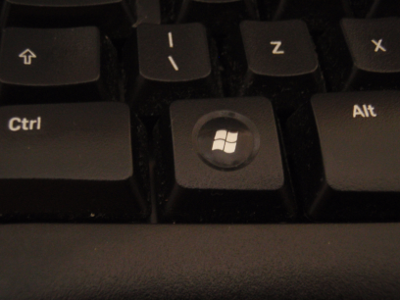
Keyboards without a windows key are few and far between. Here is a picture of one from ZaReason.
Todays announcement from Google that they are going to release an operating system may cause keyboard manufacturers to think about their little windows adverts a bit more carefully. Initially Google is targeting netbooks with integrated keyboards, presumably they won’t tolerate a windows logo on the keyboard. If and when the Chrome OS moves to a more desktop like platform will Google start pressing OEMs to add a Chrome key? Or will the key be neutralised to a more generic symbol that doesn’t advertise an operating system at all?
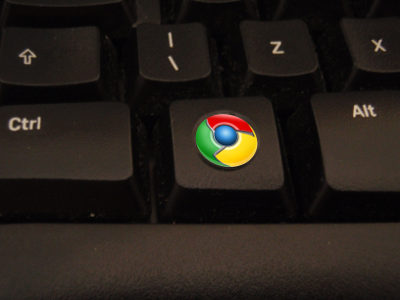
Promises, promises
Microsoft made an interesting announcement, they are promising not to sue people for using Mono. Jolly good of them really, it is nice not being sued.
Lets just assume for the moment that this promise means what they say it means (forgetting about the partial implementations exclusion and the fact that the promise needed to be made in the first place) and it makes Mono totally safe to use now, even in countries with broken patent laws. I still won’t be using Mono. Mono is a useful tool for solving the problem “how on earth am I going to run all this .Net code I wrote when I switch to Linux?” I for one don’t have that problem, but for those that do, Mono is the tool for the job.
The reason I won’t be using Mono is that the .Net framework is already embraced by Microsoft, it is already extended by Microsoft. It was from the beginning and will probably always remain so. Mono is playing catch up and people want to be using the leader. This goes for Moonlight and Silverlight too. Silverlight 2 came out, some misguided websites moved to it, Moonlight 2 is in progress, but following. The only glimmer of hope for Mono as something that is more than a specific problem solving tool is GTK#. In this, the Free software community is taking the upper hand by extending Mono, in ways that Microsoft won’t follow. Maybe if .Net/GTK# applications become the norm on Windows this would be a good thing overall. Personally I will stick to Python/GTK on Ubuntu for my fairly limited desktop app programming requirements.
